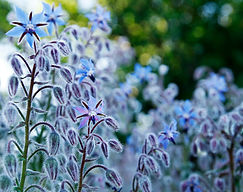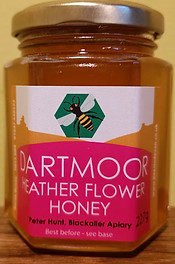BEES DAY
HONEY TODAY
SPRING IS NOT FAR AWAY
Have you noticed that in early Spring the first flowers to flower are white, then a little later on they are yellow, followed by much later on the blues. Snowdrops are being replaced by daffodils & primroses.

First inspection today.After so much wet weather all winter,bees seem to have pulled through.Even got a sting or two!!



Peter is in Exter every Thursday morning at Exeter's organic market. Just around the corner from the Cathedral. He is also selling wools from his own sheep, born & raised on Dartmoor. Various colours available.
From whites to yellows



Dartmoor receives significant funding boost
The National Lottery Heritage Fund has awarded more than £3 million to a programme working to restore nature in Dartmoor NP.
Dartmoor National Park Authority announced that the Dartmoor Dynamic Landscapes partnership was given an amount of £3,124,179 to help re-establish nature and protect and "enhance the cultural heritage" in the area.
It said the work would help deliver a wide range of projects covering rivers, habitat and species conservation, as well as creative events and engagement activities.
28th January 2025
https://www.birdguides.com/news/dartmoor-receives-significant-funding-boost


Home woven rugs available from Peter

Widecombe in the Moor, summertime!


Moorlands are a mosaic of greens and browns, mosses & shrubs, wild berries & waving grasses. Some plants grow little & only reach your ankles. but even so, walking may require careful attention. There are hummocks covered in heather (Calluna vulgaris) and / or cotton grass (Eriophorum spp.) but in between, there may be somewhat soggy patches of sphagnum moss. Lying beneath the moss, heather and sedge is peat – this is a nutrient-poor, but carbon rich mass of partly decayed organic matter.
Plants growing in the bogs are rooted in the peat but are also contributing to ‘new peat’ as they grow. As their leaves wither and die, they drop into the acidic and watery surroundings – a process that has been going on for possibly for millennia. In some locations, this process goes right back to the end of the last ice age.
In the spring and summer, birds visit the pools on the moor, they pick off aquatic insects (such as diving beetles) to feed their chicks. The patchwork of moorland vegetation also offers a degree of camouflage for the birds (sandpipers, plovers and greenshanks) and their offspring. A peat bog is mainly composed of water, which is filtered by the plant material present. Peat offers a home to a small group of specialised plants that have adapted to the nutrient-poor, waterlogged, and acid conditions. The importance of moors and bogs lies in their ability to sequester carbon - contributing to the fight against climate change.
https://www.woodlands.co.uk/blog/flora-and-fauna/moorlands-peat-and-bogs/


Phil and Barbara from Marlborough, S.I. N.Z. : Peter's Dartmoor honey is a unique taste, a kind of light citrus taste which surprised our taste buds. In N.Z. Barbara produced Manuka honey for years, she found Peter's honey exceptional and unique & with Phil highly recommends it. Well done Peter!
Oct. 2023

Dartmoor is a haven for wild life, mammals, wild & domesticated, but it is especially important for insects, bees included. Insect population has decreased by 80% over the past couple of decades, it's inimaginable really that mankind can wipe out so much life is so short a time. Of course with less & less insects there are less & less birds!
The global decline of insect populations has become increasingly evident in recent years, with not just a decrease in individual insect numbers but also a collapse in insect diversity. A special issue of the journal Biology Letters has been published to provide a comprehensive understanding of the causes and consequences of this alarming trend.
The experts concluded that the primary drivers of the worldwide insect decline are land-use intensification, climate change, and the spread of invasive animal species due to human trade.
The results suggest that not only do land-use intensification, global warming, and the dispersal of invasive species contribute individually to the disappearance of insects, but they also interact with one another.
“Ecosystems deteriorated by humans are more susceptible to climate change and so are their insect communities,” explained Dr. Menzel.
Additionally, invasive species can more easily establish themselves in habitats damaged by human activity, displacing native species. As a result, while many insect species decline or become extinct, a few others, including invasive species, thrive and increase. This decreases diversity among insect communities across habitats.... (www earth.com)
FIRST PRIZE : 2023 IN CHUDLEIGH SHOW







photo thanks to Visitdartmoor.co.uk
Have you heard about this?
"A judge’s ruling that people do not have the right to wild camp on Dartmoor without landowners’ permission “went too far” and could affect bird-watching, fishing and other activities, campaigners have argued at the Court of Appeal.
The Dartmoor National Park Authority (DNPA) is challenging a High Court judgment that a nearly 40-year-old piece of legislation did not provide such a right, despite arguments that wild camping was a long-held local custom.
Lawyers for the authority argue that a ruling secured by a landowning couple was “wrong” and “failed… to appreciate that camping is an open-air recreation” under a 1985 law over rights of access to Dartmoor Commons.
The Open Spaces Society (OSS), a conservation charity intervening in support of the DNPA’s Court of Appeal challenge at a hearing in London on Tuesday, claims that a judge’s conclusions created “uncertainty” and did not consider the “wider public interest”.
A crowd of protesters, including Green Party MP Caroline Lucas, gathered outside the Royal Courts of Justice during proceedings, waving placards calling for the need to “defend Dartmoor” and arguing that “the stars are for everyone”. Tom Pilgrim


Peter Hunt
Peter has kept bees since the age of 12 when he pestered his Mum for his own hive. With a lifetime's knowledge, he is often consulted about successful beekeeping, from simple hive suggestions to the latest information on fatal viruses. Peter has worked at Buckfast Abbey with World famous Brother Adam's bees.
Peter has now joined the British Black Bee (BBBee)Association with the intention of re-introducing the BBBee to Dartmoor.
We support & take part in local organic businesses in the Exeter & Newton Abott area of Devon. You can find our honey in a number of shops. You can meet me (Peter) in Exeter every Thursday morning, come rain, come shine!
SUPPORT YOUR LOCAL BUSINESSES & BUY LOCAL.
https://realfoodexeter.co.uk/



Our honeys are produced by bees living out in the wild, both in Devon & in Cornwall.
The summer honey comes from bramble, heather, dandelions & tree nectars such as sycamore, oak, chestnut & fruit trees. Honey colours & tastes vary according to the flowers in season. If the honey is dark in colour & has a strong rich flavour it may mean that the flowers where the bees find their nectar is from oak or chestnut trees. By contrast honey from acacia tree flowers is a very light coloured honey with a light refined flavour. A mixture of flowers such as in Spring is usually a light to medium colour honey with a subtle flowery taste.


